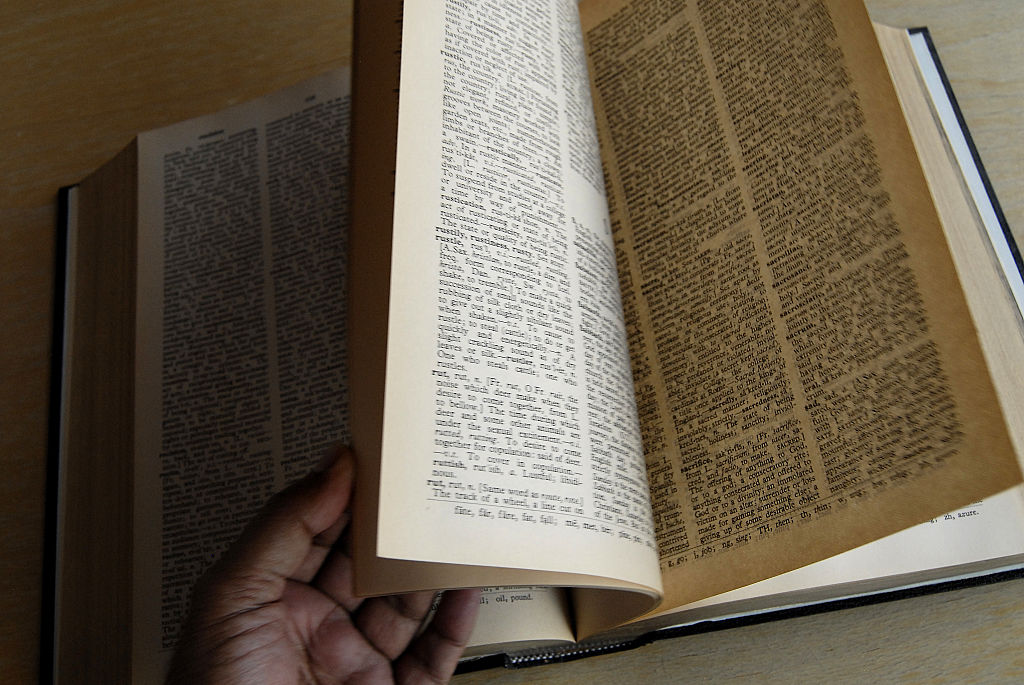
The Merriam Webster and dictionary.com chose "pandemic" as Word of the Year for 2020, even as many new words found prominence in common usage PHOTO: Getty Images
You must have heard words like netizens, Tiktokers, YouTubers, reel, trolls and others. Their origin is rooted in the internet boom and lifestyle changes that followed. With the constant changes around the world, many new words are added to the dictionary on a daily basis. Every word has a history of its own but most importantly they manifest important events in history which are overlooked.
Remember the word “Reparation”, though, not a new coinage, but became prominent in India after the lecture by Member of Parliament Dr Shashi Tharoor at Oxford University, titled “Britain Does Owe Reparations”. Tharoor is known to have a strong grasp on the English language and his use of the word brought it into the limelight. Well known for his prowess, he uses a lot of words in his speeches and conversations that are not commonly used. Another term “multi-alignment” referring to India’s shift over the years from the policy of “non-alignment” was first used by him.
Over time or due to developments, the meaning of words can also change, for instance, lockdown (prison-like confinement) and quarantine (self-isolation), social distancing (preventive physical distancing to stop the spread of a disease). Their meaning was different in the pre-Covid19 era.
With Covid-19, there was an explosion of new words and alterations in the meaning of existing words. We saw the emergence of words like Covidiots (those who don’t follow Covid guidelines), Covideo party (online party), Covidient (one who obeys every Covid-related guidance), and WFH (work from home). These words were also introduced to different languages and are slowly becoming an integral part of them. Linguistics have started studying these neologisms, coinage of new words, with the coming of Covid.
It can safely be said that we never used so many words from the medical field. Words like asymptomatic, co-morbidities, clinical trial, virus, community spread, the incubation period (the period between catching the virus and developing symptoms), ventilators, zoonotic (virus in an animal that can affect human), sanitiser, immunity and many more have become frequent in our language and even part of metaphors and phrases.
When the pandemic kickstarted the use of new words, dictionaries were updated and the new words added. The executive editor of Oxford dictionary Bernadette Paton, said in April, “These are extraordinary times, and Oxford English dictionary’s lexicographers, who like many others are all working from home… are tracking the development of the language of the pandemic and offering a linguistic and historical context to their usage.”
Oxford English dictionary, this year chose not to declare Word of the Year because 2020 has been“a year which cannot neatly be accommodated in one single word.” Merriam Webster and dictionary.com chose “pandemic” as Word of the Year. This year has been very happening in a way, as people were seeing unprecedented events, therefore needed new words to express themselves.
A paper titled ‘Linguistic Analysis of Covid-19’ says, “Very often we coin innovative words to explain or describe new ideas and things, but importantly when there is no word presently available to more accurately express our thoughts or experiences which is called neologism. Neologism (coinage of new words) also represents loan words, acronyms, and abbreviations.”
This becomes even more interesting in multilingual societies like India, where people tend to mix various languages to convey meaning. Words like “khadi clad”, “heropanti” “filmygyan” formed by mixing two languages keep on adding up and later travel all over the world. This is a continuous process, say, linguists.
Language is fluid and keeps on developing — giving up old words, words changing in meaning, metaphors being added, phrases and proverbs being created are all part of it. Now with internet connectivity, new words are travelling faster than ever, so these changes have become more visible.
Often, events that define the course of history have been instrumental in giving new words to language. Like Britain’s exit from the EU (Brexit) and politics of the time gave rise to the use of words like “post-truth” “hard borders”. Similarly, World War II gave us words like “radar” and during the First World War words like “propaganda” gained prominence.
When the 1970 environmental movement started, words like, “eco-warriors”, “eco-tours”, “sustainable development”, “stakeholders” came in common usage. Later when environmental issues became more prominent, many other words like “climate change” came in common parlance. Similarly, other historic events like the cold war, 9/11, Vietnam war, the financial crisis added new words. Now, Covid-19 is one such important historical event in history that has given birth to so many words that we are using.
Delhi hosted what organisers describe as the world’s first player auction in golf, launching ‘72…
An elderly woman recalls how her six-year-old granddaughter lay bleeding after a speeding car hit…
Municipal Corporation of Delhi plans a unified policy enabling RWAs to adopt and maintain parks…
A 17-year-old boy allegedly died by suicide after jumping before a moving train at Uttam…
Delhi High Court grants bail to 26-year-old Thar driver accused of mowing down two in…
Two Rohini men arrested for fatally stabbing one person and injuring another during a robbery…